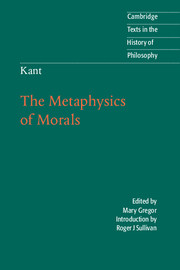Book contents
- Frontmatter
- Contents
- Introduction
- Chronology
- Further reading
- Translator's note on the text
- Part I Metaphysical first principles of the doctrine of right
- Part II Metaphysical first principles of the doctrine of virtue
- I Doctrine of the elements of ethics
- II Doctrine of the methods of ethics
- Index
- Miscellaneous Endmatter
I - Doctrine of the elements of ethics
from Part II - Metaphysical first principles of the doctrine of virtue
- Frontmatter
- Contents
- Introduction
- Chronology
- Further reading
- Translator's note on the text
- Part I Metaphysical first principles of the doctrine of right
- Part II Metaphysical first principles of the doctrine of virtue
- I Doctrine of the elements of ethics
- II Doctrine of the methods of ethics
- Index
- Miscellaneous Endmatter
Summary
Introduction
The Concept of a Duty to Oneself Contains (at First Glance) a Contradiction
If the I that imposes obligation is taken in the same sense as the I that is put under obligation? a duty to oneself is a self-contradictory concept. For the concept of duty contains the concept of being passively constrained (I am bound). But if the duty is a duty to myself, I think of myself as binding and so as actively constraining (I, the same subject, am imposing obligation). And the proposition that asserts a duty to myself (I ought to bind myself) would involve being bound to bind myself (a passive obligation that was still, in the same sense of the relation, also an active obligation), and hence a contradiction. – One can also bring this contradiction to light by pointing out that the one imposing obligation (auctor obligationis) could always release the one put under obligation (subiectum obligations) from the obligation (terminus obligationis), so that (if both are one and the same subject) he would not be bound at all to a duty he lays upon himself. This involves a contradiction.
For suppose there were no such duties: then there would be no duties whatsoever, and so no external duties either. – For I can recognize that I am under obligation to others only insofar as I at the same time put myself under obligation, since the law by virtue of which I regard myself as being under obligation proceeds in every case from my own practical reason; and in being constrained by my own reason, I am also the one constraining myself.
- Type
- Chapter
- Information
- Kant: The Metaphysics of Morals , pp. 171 - 218Publisher: Cambridge University PressPrint publication year: 1996



